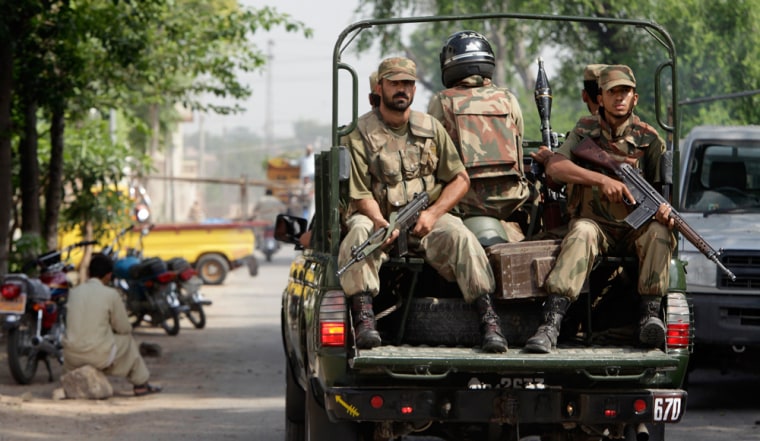The Obama administration wants to give $2 billion in military assistance to Pakistan, Secretary of State Hillary Clinton said Friday. However, the United States will withhold funding from some Pakistani military units because of allegations of extra-judicial killings and torture.
A senior U.S. official said Thursday that aid given to units believed to have committed, encouraged or tolerated abuses had been suspended under 1997 legislation championed by Sen. Patrick Leahy.
The so-called Leahy Amendment bars U.S. military assistance from going to foreign armed forces suspected of committing atrocities.
"In accordance with the Leahy Amendment, we have withheld assistance from a small number of units linked to gross human rights violations," the official said.
"At the same time, we have encouraged Pakistan to improve its human rights training, and it is taking steps in that direction," the official added. The official spoke on condition of anonymity because he was not authorized to speak publicly on the matter.
The alleged abuses did not stop Clinton's expected announcement — that the administration would ask Congress to approve $2 billion to help Pakistan's military — from going ahead as planned Friday.
The new aid package would cover the period from 2012 to 2016 and would help Pakistan to do more to fight extremists there and in neighboring Afghanistan.
'No stronger partner'
The announcement came at the end of three days of high-level strategic talks in Washington between top U.S. and Pakistani officials, including Pakistani army chief Gen. Ashfaq Parvez Kayani.
"The United States has no stronger partner when it comes to counterterrorism efforts against the extremists who threaten us both than Pakistan," Clinton said.
She said Pakistani and U.S. officials had "productive discussions" this week about eliminating extremist groups operating in Pakistan.
"These groups threaten the security first and foremost of the people of Pakistan, of neighbors, of the United States and indeed of the world," Clinton told Pakistani and U.S. officials participating the wide-ranging talks.
Pakistani Foreign Minister Shah Mehmood Qureshi said it was time to counter naysayers who argue that Islamabad's heart is not in the fight against the insurgents.
"Prophets of doom are back in business, painting doomsday scenarios about our alliance," he said. "They are dead wrong."
It was not immediately clear when the decision to withhold the assistance from certain Pakistani units because of human rights abuses was taken, but The New York Times first reported it late Thursday.
Citing unnamed officials, the newspaper reported about half a dozen Pakistan military units were believed to have killed civilians and unarmed prisoners and would be affected by the removal of funding. Other units could be added to the list, the Times reported.
Pakistan has not been told of the decision by the White House, the Times said, citing officials from both countries. However, it added that a small number of senior members of Congress, had been told.
'Real concerns'
According to the Times, units affected by the cut include Pakistani special operations forces who have carried out attacks on the Taliban in Pakistan's Swat Valley and South Waziristan.
Speaking to the Times Wednesday from his home in Vermont, Leahy said he had warned the Obama administration about the suspected abuses.
"I told the White House that I have real concerns about the Pakistani military's actions, and I'm not going to close my eyes to it because of our national interests in Pakistan," he said.
"If the law is going to have teeth, it has to be taken seriously. Pakistan's military leaders have made encouraging statements about addressing these issues, but this requires more than statements," he added.
A senior Pakistani official told the Times that the U.S. had expressed concern about claims of extra-judicial killings and said Pakistan's government was taking steps to address the problem.
However, the official said the U.S. "has not threatened us with withholding of assistance or training for any of our military units on these grounds," the paper reported.
In June, the Human Rights Commission of Pakistan, a non-governmental organization, said 282 extra-judicial killings had been committed in the Swat region in 2009, according to the Times.
A senior State Department official said an Internet video showing men in Pakistani military uniforms apparently executing six young men wearing civilian clothes had focused the attention of White House and State department officials on the issue.
Halting assistance to certain units will not affect broader U.S. support for Pakistan's military, which is considered key to counter-terrorism efforts in the region.
Kayani, the Pakistani army chief, has pledged to improve the military's human rights record in numerous discussions with U.S. officials.
"As General Kayani has said repeatedly in public and in private, professional standards and enforcement of those standards are the hallmark of a modern and successful military," White House spokesman Tommy Vietor said in a statement.
"These issues are part of our conversations with all militaries around the world with whom we work."
